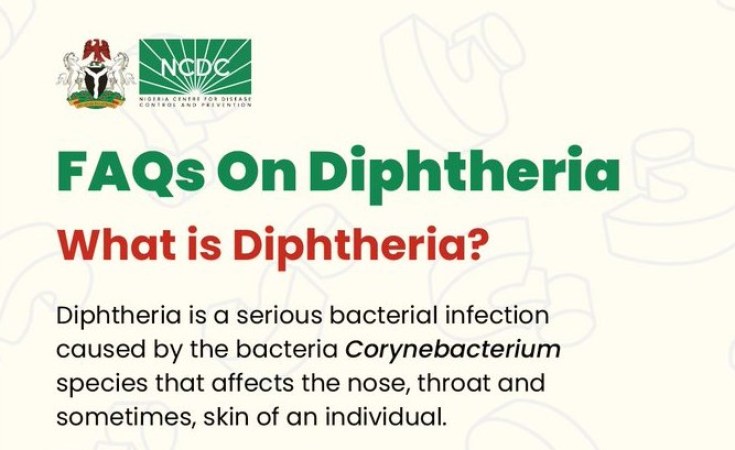A recent situation report by the World Health Organisation (WHO) confirmed that Nigeria is currently facing a second wave of diphtheria outbreak
Diphtheria infection in Nigeria has continued to increase as the Nigeria Centre for Disease Control (NCDC) reports that as of 3 October, the country has recorded 13,204 suspected cases.
Out of the suspected cases, 8,406 were confirmed from 114 local government areas (LGAs) across 19 states including the Federal Capital Territory.
The Director General of NCDC, Ifedayo Adetifa, gave the surveillance updates Tuesday at the diphtheria taskforce's inaugural press briefing.
Meanwhile, a recent situation report by the World Health Organisation (WHO) confirmed that Nigeria is currently facing a second wave of diphtheria outbreak with a total of 4,717 confirmed cases out of 8,353 suspected cases as of 15 September.
The global body observed an increase in the affected population with a rise in the number of confirmed cases and related deaths.
Breakdown of diphtheria cases
Giving a further breakdown of the diphtheria cases at the press briefing, the NCDC DG noted that of the 8,406 confirmed cases, 6,202 (73.7 per cent) were aged one to 14 years.
Mr Adetifa noted that with 7,188 cases, Kano State in the North-west accounted for 86 per cent of the total 8,406 confirmed cases.
He said Yobe state followed on the log of infections with 775 cases, while Katsina and Borno recorded 232 and 118 cases respectively.
The NCDC DG further noted that Jigawa State recorded 23 infections, followed by Bauchi, 20; Kaduna, 17; Lagos, eight; FCT, six; Gombe, five; while Osun and Sokoto states recorded three cases each.
Niger State recorded two cases, while six states: Cross River, Enugu, Imo, Nasarawa, Zamfara, and Kebbi recorded a single case each.
Mr Adetifa noted that the national diphtheria taskforce deployed National Rapid Response Teams (NRRT) last week to Kano, Yobe, Katsina, Bauchi, Borno, Kaduna, Jigawa and Zamfara to support the outbreak response in the states.
Vaccination update
According to the NCDC boss, records have shown that most of the confirmed cases in the country were unvaccinated against diphtheria.
He said: "Of the 8,406 confirmed cases, 5,371 (64 per cent) are either unvaccinated or partially vaccinated, 966 (11 per cent) with unknown vaccination status while 2,069 (25 per cent) are fully vaccinated against diphtheria.
"The recently deployed NRRT is offering on-site surveillance and response support to affected states in areas of active case search in communities and health facilities.
"Security challenges are however limiting accessibility of some teams to some locations in affected LGAs across states."
Case management
Mr Adetifa noted that in some states where there are issues of inadequate bed spaces for patients, "NCDC will continue to work with our colleagues in the states to set up emergency wards for the treatment of patients."
He also announced that Katsina Federal Teaching Hospital has agreed to waive bed fees for diphtheria patients admitted into their care.
Speaking further on case management, he said NCDC has developed and disseminated Standard Operating Procedures for Diphtheria Antitoxin (DAT) use in health facilities and treatment centres.
He also said in collaboration with the State Ministry of Health, NCDC has established Diphtheria Treatment Centres/Wards in affected States.
"We continue to support states with the procurement, preposition and distribution of laboratory consumables and reagents to subnational laboratories," he added.
NCDC response
Speaking further on NCDC's intervention, Mr Adetifa said through the laboratory network, they continue to conduct preliminary and confirmatory testing at sub-national and national levels respectively.
He said that there are currently 14 laboratories in the Diphtheria Laboratory Network with the capacity to support diphtheria testing and an optimisation of five additional laboratories at the subnational is currently ongoing.
"We have conducted training for laboratory personnel at the sub-national level on laboratory diagnostic processes, quality assurance, biosafety and biosecurity procedures, and data management," he said.
He added that with the support of our partners including UKHSA, WHO and MSF, the NCDC have been able to conduct refresher training for the deployed National Rapid Response Team laboratory personnel.
About diphtheria
NCDC explained that diphtheria is a serious bacterial infection caused by the bacterium called Corynebacterium species that affects the nose, throat and sometimes, the skin of an individual.
It noted that people most at risk of contracting diphtheria are children and adults who have not received any or a single dose of the pentavalent vaccine (a diphtheria toxoid-containing vaccine), people who live in a crowded environment, in areas with poor sanitation and healthcare workers who are exposed to suspected or confirmed cases of diphtheria.
On transmission, NCDC added that the disease spreads easily among people through direct contact with infected people, droplets from coughing or sneezing and contact with contaminated clothing and objects.
The symptoms of diphtheria include fever, runny nose, sore throat, cough, red eyes (conjunctivitis) and neck swelling. In severe cases, NCDC said that a thick grey or white patch appears on the tonsils and/or at the back of the throat associated with difficulty breathing.


